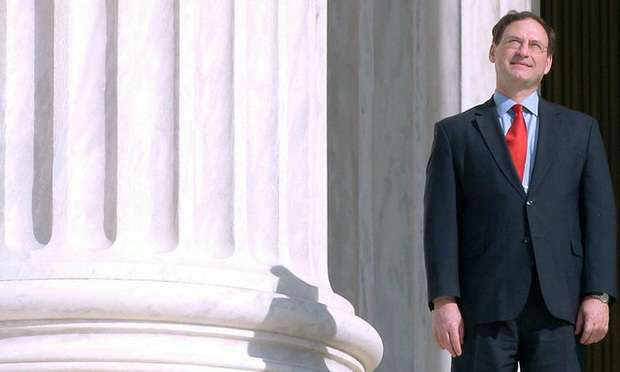Justices Rule States and Feds Can Prosecute Someone for 'Same Crime'
Ginsburg said in her dissent: "Different parts of the 'WHOLE' United States should not be positioned to prosecute a defendant a second time for the same offense. I would reverse Gamble's federal conviction."
June 17, 2019 at 10:39 AM
5 minute read
 Justice Samuel Alito Jr. Credit: Diego M. Radzinschi / ALM
Justice Samuel Alito Jr. Credit: Diego M. Radzinschi / ALM
The U.S. Supreme Court on Monday refused to overrule a 170-year-old exception to the constitutional prohibition against prosecuting someone more than once for the same offense.
The exception to the Constitution's double jeopardy clause, known as the “dual sovereignty doctrine,” allows a state to prosecute a defendant under state law even if the federal government has prosecuted him or her for the same conduct under federal law.
“We have long held that a crime under one sovereign's laws is not 'the same offence' as a crime under the laws of another sovereign,” wrote Justice Samuel Alito Jr. for the 7-2 majority in Gamble v. United States. “We see no reason to abandon the sovereign-specific reading of the phrase 'same offence,' from which the dual-sovereignty rule immediately follows.”
Alito said that fidelity to the double jeopardy clause's text “does more than honor the formal difference between two distinct criminal codes. It honors the substantive differences between the interests that two sovereigns can have in punishing the same act.”
Justices Ruth Bader Ginsburg and Neil Gorsuch wrote separately in dissents.
“A free society does not allow its government to try the same individual for the same crime until it's happy with the result. Unfortunately, the court today endorses a colossal exception to this ancient rule against double jeopardy,” Gorsuch wrote in his dissent.
Alito rejoined: “The United States is a federal republic; it is not, contrary to Justice Gorsuch's suggestion, a unitary state like the United Kingdom.”
Ginsburg said in her dissent: “Different parts of the 'WHOLE' United States should not be positioned to prosecute a defendant a second time for the same offense. I would reverse Gamble's federal conviction.”
Terance Gamble is an Alabama man who was convicted and sentenced in state and federal prosecutions for the same crime: felon in possession of a firearm. Gamble, represented by Jones Day partner Louis Chaiten, had asked the justices to overrule a doctrine known as the “separate sovereigns” exception to the Fifth Amendment's double jeopardy clause.
Gamble's case initially drew considerable attention because of its potential import for Special Counsel Robert Mueller III's possible federal prosecutions of Russian interference in the 2016 election and involvement of the Trump campaign. Without the separate sovereigns exception, states would be barred from pursuing parallel prosecutions under their state laws.
The outcome of the case was being closely watched for its potential impact on state prosecutions of Paul Manafort, the former Trump campaign manager convicted in federal court in Washington and Virginia on various financial and lobbying crimes. Separately, state prosecutors have brought charges in New York.
During arguments in December, a number of justices appeared skeptical of Chaiten's position. Chaiten emphasized that the separate sovereigns exception was inconsistent with the original meaning of the double jeopardy clause as well as its text and purpose.
Justice Brett Kavanaugh, himself a self-described originalist, said that argument conflicted with “another part of the original understanding—stare decisis” (standing by precedent). Justice Elena Kagan told Chaiten that his argument seemed “a little bit one-note” and that he needed to offer more in order to persuade her to overrule the exception.
At oral argument, Ginsburg told Assistant to the Solicitor General Eric Feigin that the separate sovereigns doctrine has been “widely criticized” by federal judges and academics.
Feigin responded that many of those critical comments also recognized that “some exceptions are necessary, and that successive prosecutions and separate prosecutions are sometimes necessary to vindicate particular sovereign interests.”
Eliminating the exception, Feigin warned, would create a host of practical problems, including deterring cooperation, encouraging aggressive prosecutions, a race to the courthouse, and defendants trying to play each sovereign against the other.
Chaiten, in rebuttal, told the court that at least 20 states do not have the separate sovereigns exception, and at least 37 with respect to certain crimes. “It also seems to have worked out OK,” he said.
Texas Solicitor General Kyle Hawkins shared argument time with Feigin on behalf of a coalition of 36 states.
The opinion is posted below:
Read more:
Staring Down 'Stare Decisis': How to Ask SCOTUS to Overturn Precedent
Breyer Denounces Ruling That Strikes Precedent, Questions Which Cases Are Next
This content has been archived. It is available through our partners, LexisNexis® and Bloomberg Law.
To view this content, please continue to their sites.
Not a Lexis Subscriber?
Subscribe Now
Not a Bloomberg Law Subscriber?
Subscribe Now
NOT FOR REPRINT
© 2025 ALM Global, LLC, All Rights Reserved. Request academic re-use from www.copyright.com. All other uses, submit a request to [email protected]. For more information visit Asset & Logo Licensing.
You Might Like
View All
Private Equity Giant KKR Refiles SDNY Countersuit in DOJ Premerger Filing Row
3 minute read
Skadden and Steptoe, Defending Amex GBT, Blasts Biden DOJ's Antitrust Lawsuit Over Merger Proposal
4 minute read
Quinn Emanuel Files Countersuit Against DOJ in Row Over Premerger Reporting
3 minute read
Read the Document: DOJ Releases Ex-Special Counsel's Report Explaining Trump Prosecutions
3 minute readTrending Stories
- 1'Didn't Notice Patient Wasn't Breathing': $13.7M Verdict Against Anesthesiologists
- 2'Astronomical' Interest Rates: $1B Settlement to Resolve Allegations of 'Predatory' Lending Cancels $534M in Small-Business Debts
- 3Senator Plans to Reintroduce Bill to Split 9th Circuit
- 4Law Firms Converge to Defend HIPAA Regulation
- 5Judge Denies Retrial Bid by Ex-U.S. Sen. Menendez Over Evidentiary Error
Who Got The Work
J. Brugh Lower of Gibbons has entered an appearance for industrial equipment supplier Devco Corporation in a pending trademark infringement lawsuit. The suit, accusing the defendant of selling knock-off Graco products, was filed Dec. 18 in New Jersey District Court by Rivkin Radler on behalf of Graco Inc. and Graco Minnesota. The case, assigned to U.S. District Judge Zahid N. Quraishi, is 3:24-cv-11294, Graco Inc. et al v. Devco Corporation.
Who Got The Work
Rebecca Maller-Stein and Kent A. Yalowitz of Arnold & Porter Kaye Scholer have entered their appearances for Hanaco Venture Capital and its executives, Lior Prosor and David Frankel, in a pending securities lawsuit. The action, filed on Dec. 24 in New York Southern District Court by Zell, Aron & Co. on behalf of Goldeneye Advisors, accuses the defendants of negligently and fraudulently managing the plaintiff's $1 million investment. The case, assigned to U.S. District Judge Vernon S. Broderick, is 1:24-cv-09918, Goldeneye Advisors, LLC v. Hanaco Venture Capital, Ltd. et al.
Who Got The Work
Attorneys from A&O Shearman has stepped in as defense counsel for Toronto-Dominion Bank and other defendants in a pending securities class action. The suit, filed Dec. 11 in New York Southern District Court by Bleichmar Fonti & Auld, accuses the defendants of concealing the bank's 'pervasive' deficiencies in regards to its compliance with the Bank Secrecy Act and the quality of its anti-money laundering controls. The case, assigned to U.S. District Judge Arun Subramanian, is 1:24-cv-09445, Gonzalez v. The Toronto-Dominion Bank et al.
Who Got The Work
Crown Castle International, a Pennsylvania company providing shared communications infrastructure, has turned to Luke D. Wolf of Gordon Rees Scully Mansukhani to fend off a pending breach-of-contract lawsuit. The court action, filed Nov. 25 in Michigan Eastern District Court by Hooper Hathaway PC on behalf of The Town Residences LLC, accuses Crown Castle of failing to transfer approximately $30,000 in utility payments from T-Mobile in breach of a roof-top lease and assignment agreement. The case, assigned to U.S. District Judge Susan K. Declercq, is 2:24-cv-13131, The Town Residences LLC v. T-Mobile US, Inc. et al.
Who Got The Work
Wilfred P. Coronato and Daniel M. Schwartz of McCarter & English have stepped in as defense counsel to Electrolux Home Products Inc. in a pending product liability lawsuit. The court action, filed Nov. 26 in New York Eastern District Court by Poulos Lopiccolo PC and Nagel Rice LLP on behalf of David Stern, alleges that the defendant's refrigerators’ drawers and shelving repeatedly break and fall apart within months after purchase. The case, assigned to U.S. District Judge Joan M. Azrack, is 2:24-cv-08204, Stern v. Electrolux Home Products, Inc.
Featured Firms
Law Offices of Gary Martin Hays & Associates, P.C.
(470) 294-1674
Law Offices of Mark E. Salomone
(857) 444-6468
Smith & Hassler
(713) 739-1250










